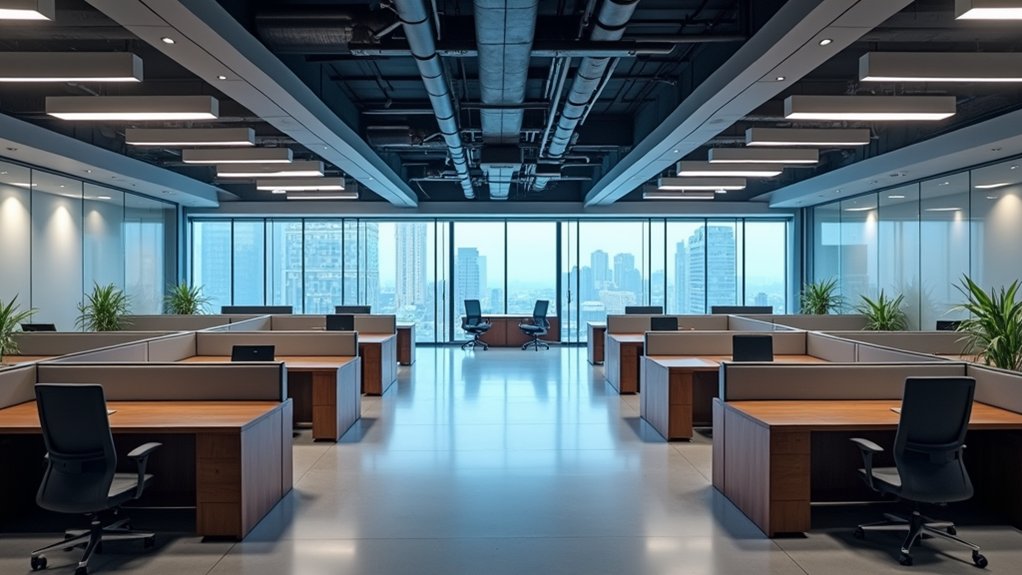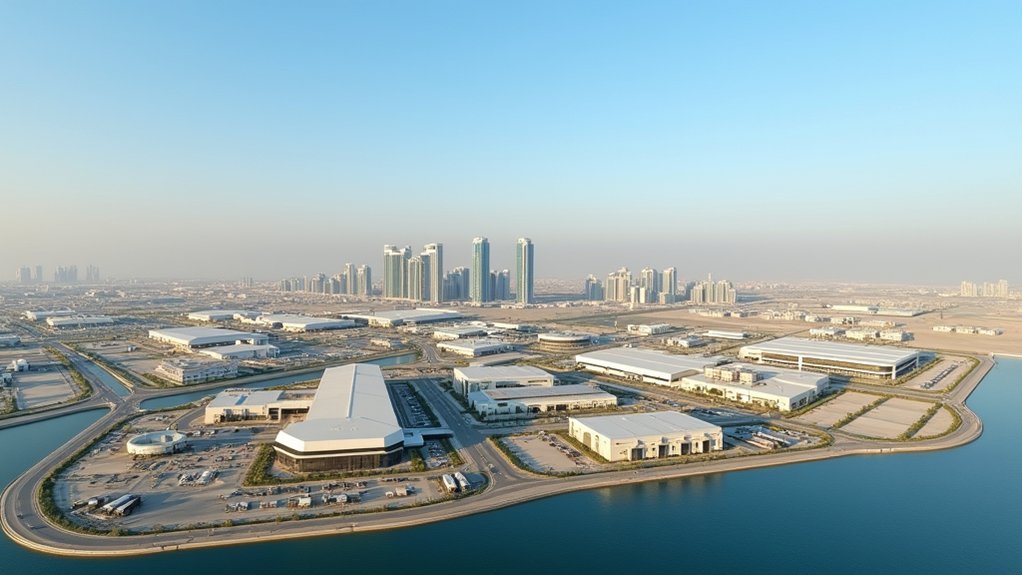Free zone office packages offer flexible workspace options with minimal paperwork, enabling 100% foreign ownership and lower setup costs, starting around AED 10,000. In contrast, mainland setups necessitate a physical office space of at least 200 square feet, involve local sponsorship, and start at higher capital investments of AED 150,000. Tax obligations also differ; free zones typically provide 0% corporate tax, while mainland companies face a starting rate of 9%. Each arrangement has unique visa regulations and market access limitations. Understanding these distinctions is essential for aligning your business goals with the most advantageous legal framework. Further insights await you.
Overview of Free Zone Office Packages

When you're considering starting a business in the UAE, Free Zone office packages offer an appealing solution tailored for entrepreneurs like you. These packages provide flexible workspace options, including shared offices, dedicated desks, and virtual offices, catering specifically to startups and small businesses. With competitive pricing starting as low as AED 10,000, they present an attractive financial proposition. Additionally, these packages often include access to valuable business support services and networking events, fostering connections essential for growth. Certain Free Zones even offer specialized packages designed for specific industries, enhancing operational relevance. Importantly, Free Zone office packages require minimal paperwork and feature expedited licensing processes, facilitating faster business establishment, allowing you to focus on what truly matters—growing your enterprise. Furthermore, the benefits of operating within a free zone include 100% foreign ownership, enabling you to maintain full control of your business.
Key Features of Mainland Setups
Establishing a business on the mainland of the UAE offers distinct advantages that cater to a wide range of entrepreneurial needs. Mainland setups require a minimum physical office space of 200 square feet, ensuring you have a tangible market presence. You'll need to obtain a trade license from the Department of Economic Development, which oversees your commercial activities. Unlike free zone setups, mainland businesses can operate freely across the UAE, granting you broader market access without significant restrictions. A local sponsor or UAE national partner is often necessary, promoting compliance with local ownership regulations. Additionally, mainland setups mandate annual financial audits, ensuring transparency and accountability in operations, which can enhance your business's credibility and trustworthiness in the competitive landscape. Furthermore, mainland businesses benefit from a business-friendly environment that minimizes bureaucracy, allowing for more efficient operations.
Ownership and Capital Requirements
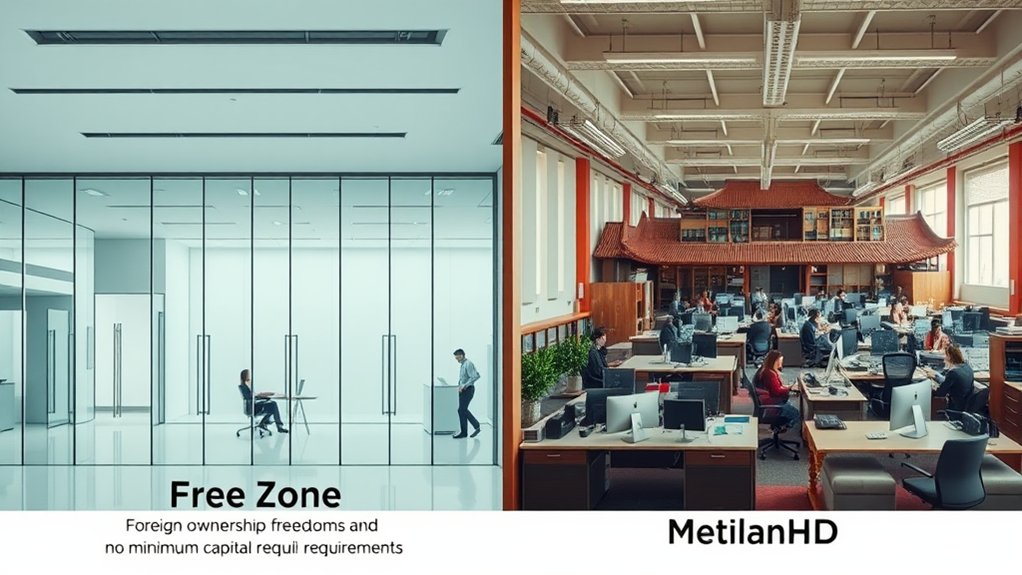
When considering business structures in the UAE, it's essential to understand the distinctions in ownership and capital requirements between free zone and mainland setups. Free zone companies offer the advantage of 100% foreign ownership and lower capital thresholds, while mainland businesses necessitate local partnerships and higher minimum capital investments. Additionally, the shareholder structure varies greatly, with free zones allowing for a single shareholder compared to the minimum of two required for mainland companies, which can influence your decision-making process. Furthermore, physical office presence is mandatory for mainland businesses, further complicating the setup process compared to the more flexible options available in free zones.
Shareholder Structure Differences
Maneuvering the shareholder structure differences between Free Zone and Mainland setups is essential for any entrepreneur. Understanding these distinctions can greatly impact your company formation strategy:
- Ownership: Free Zone companies permit 100% foreign ownership, while Mainland companies typically mandate a local sponsor holding 51% for trade-related activities, although some services allow full foreign ownership.
- Shareholders: Establishing a Free Zone company requires only one shareholder, whereas Mainland companies generally need a minimum of two shareholders.
- Minimum Share Capital: Free Zone companies can have a minimum share capital ranging from AED 50,000 to AED 1,000,000, while Mainland companies usually require AED 150,000 to AED 300,000. Additionally, understanding the specific regulatory requirements for each business structure can help you make informed decisions.
These shareholder requirements can influence your operational flexibility and initial investment decisions.
Capital Requirements Comparison
Understanding the differences in capital requirements between Free Zone and Mainland setups is essential for your business planning. Free Zones offer lower minimum share capital, typically ranging from AED 50,000 to AED 1,000,000, whereas Mainland companies often necessitate a minimum of AED 150,000 to AED 300,000. In Free Zones, you can enjoy 100% foreign ownership without a local partner, but Mainland companies generally require at least 51% local ownership for specific activities. Additionally, Free Zone setups allow for a single shareholder, while Mainland structures demand two. Office space requirements also vary; Mainland companies must secure at least 200 square feet, while Free Zones provide flexible options, including virtual offices. Visa issuance limits in Free Zones typically cap at 6-7, unlike the unrestricted issuance for Mainland companies.
Ownership Flexibility Insights
While weighing your business options, it's crucial to take into account the ownership flexibility offered by Free Zone and Mainland setups. Understanding these differences can greatly impact your business strategy in the UAE. Here are key insights:
- Foreign Ownership: Free Zones permit 100% foreign ownership without a local partner, while Mainland setups typically require at least 51% local ownership for certain activities.
- Shareholder Structure: Free Zones allow a single shareholder, whereas Mainland entities necessitate a minimum of two.
- Capital Requirements: Minimum share capital varies greatly—Free Zones range from AED 50,000 to AED 1,000,000, compared to AED 150,000 to AED 300,000 for Mainland.
These factors influence the business setup process, visa limitations, and overall operational flexibility in the UAE.
Taxation and Financial Benefits
When considering the taxation and financial benefits of Free Zone versus Mainland setups, you'll find that Free Zones offer significant advantages, such as 0% corporate tax for qualifying activities and customs duty exemptions. Additionally, the initial costs for establishing a Free Zone company are generally lower, and audit requirements may be less stringent, allowing for greater operational flexibility. Understanding these financial implications can help you make a more informed decision tailored to your business needs.
Tax Exemptions Overview
Tax exemptions play an essential role in determining the financial benefits of free zone and mainland business setups in the UAE. Free zone companies enjoy unique advantages that enhance their cost-effectiveness, which can profoundly influence your decision. Consider these key points:
- Corporate Tax: Free zone companies benefit from a 0% corporate tax rate, whereas mainland companies face a 9% corporate tax starting FY24.
- Import and Export Duties: Free zone entities are exempt from import and export duties, which is not the case for mainland businesses.
- Repatriation of Profits: Free zone setups allow for 100% repatriation of profits and capital, while mainland companies may encounter regulatory scrutiny.
These tax exemptions, along with the absence of personal income tax, create a favorable environment for your business ventures.
Audit Requirements Comparison
Understanding tax exemptions is only part of the equation when considering the financial landscape of your business setup in the UAE. Audit requirements considerably differ between mainland companies and Free Zone companies. Mainland firms must conduct annual financial audits to guarantee compliance with stringent local regulations, incurring higher operational costs. In contrast, Free Zone companies often benefit from relaxed auditing standards, with many not requiring financial audits at all, thereby lowering administrative burdens. Additionally, while mainland companies face a 9% corporate tax starting in FY24 and additional 5% VAT on goods, Free Zone companies enjoy a 0% corporate tax on qualifying activities. The absence of customs duties for Free Zone businesses further enhances their financial advantages, solidifying their appeal in the UAE market.
Financial Setup Costs
Setting up your business in the UAE involves managing various financial costs, and the differences between Free Zone and mainland setups can considerably impact your budget. Here are key factors to evaluate regarding setup costs:
- Initial Investment: Free Zone office packages typically range from AED 10,000 to AED 50,000, whereas mainland setups usually start at AED 20,000 and can go up to AED 40,000.
- Tax Benefits: Free Zone companies enjoy zero corporate tax for qualifying business activities, while mainland enterprises face a 5% VAT and a 9% corporate tax starting FY24.
- Minimum Share Capital: Mainland setups often require a minimum share capital of AED 150,000, in contrast to Free Zones, where it ranges from AED 50,000 to AED 1,000,000.
Understanding these financial implications is essential for effective business setup.
Office Space and Infrastructure
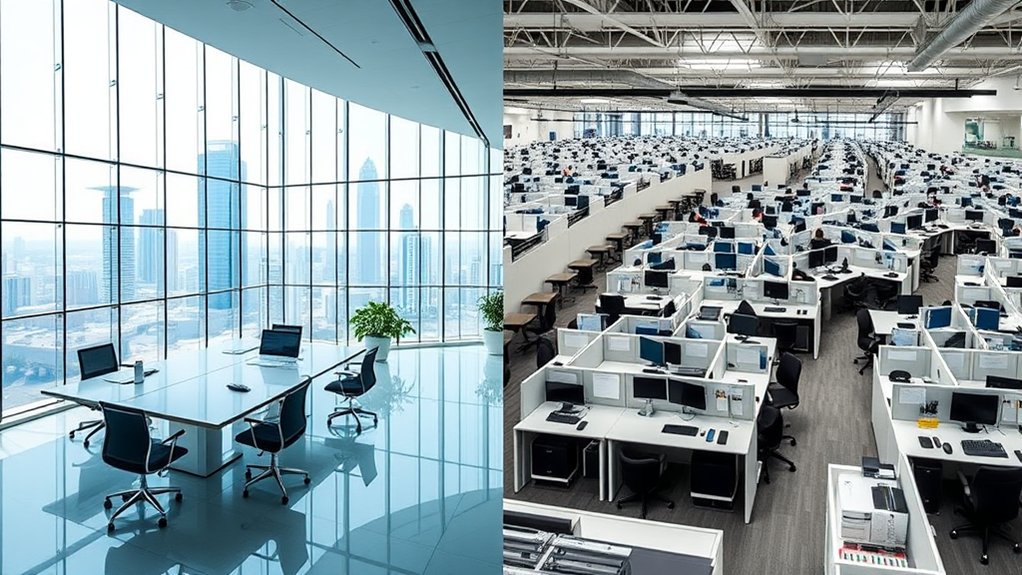
When choosing between free zone office packages and mainland setups, you'll find that the infrastructure and office space options notably differ. Free zone office packages often provide flexible arrangements, including virtual offices, whereas mainland setups impose minimum physical office requirements of 200 square feet. The regulatory office requirements vary greatly; free zones typically feature distinct regulations tailored to specific industries, enhancing operational efficiency. Additionally, many free zones offer ready-to-move-in office solutions equipped with modern amenities, which is particularly advantageous for startups. These packages may also encompass business support services and networking opportunities, which can be essential for growth. Importantly, the cost of office space in free zones usually entails lower initial investments than the higher setup costs associated with mainland offices.
Visa Regulations and Limitations
Maneuvering visa regulations can be an essential factor in deciding between free zone office packages and mainland setups. Free zone companies generally face visa limitations, allowing only 6 to 7 visas, while mainland setups impose no such restrictions, provided you secure the necessary physical office space. When considering your business setup, keep these points in mind:
- Visa Types: Free zone visas are primarily for employees and owners, whereas mainland visas cover a broader range of categories.
- Application Process: Free zone visas are typically faster and simpler to obtain than mainland visas, which require extensive documentation.
- Office Requirements: Mainland companies need physical office space for additional visas, while free zone companies can utilize virtual offices.
Understanding these regulations will guide your decision effectively.
Business Operations and Market Access
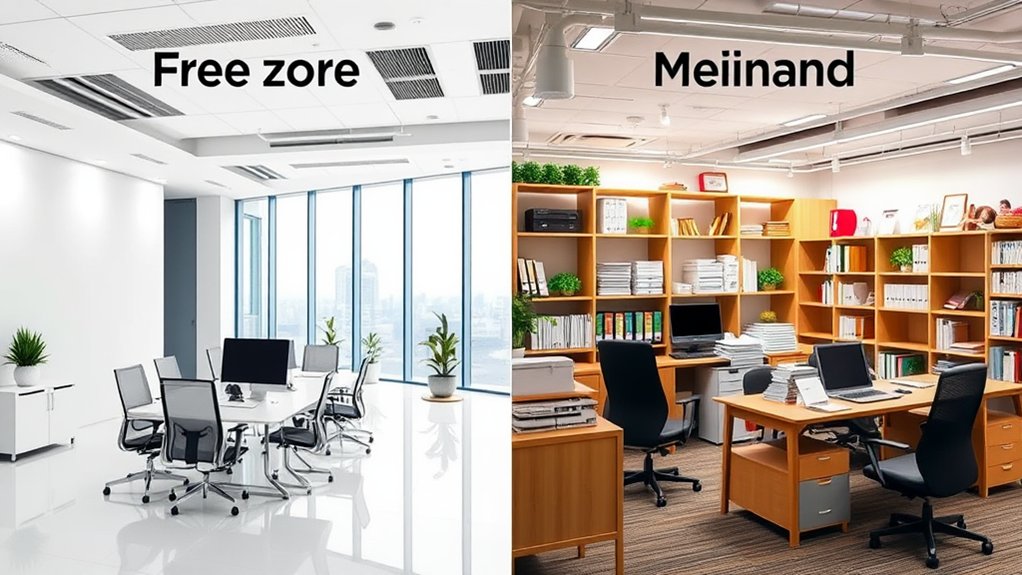
While considering your business operations, it is crucial to understand the differences in market access between free zone office packages and mainland setups. Free zone companies can only operate within their designated zones and internationally, limiting their market reach. In contrast, mainland companies enjoy unrestricted access to the entire UAE market, allowing them to engage directly with consumers and pursue lucrative government contracts. Additionally, free zone setups typically provide flexible workspace options, such as virtual offices, while mainland setups mandate a minimum physical office space. Visa restrictions also confine free zone entities to a limited number of visas, whereas mainland companies can issue unlimited visas based on their office capacity, further enhancing their operational capabilities and market presence.
Frequently Asked Questions
What Is the Difference Between Free Zone and Mainland?
Free zones offer benefits like 100% foreign ownership and lower costs, while mainland regulations require local partnerships and annual audits. You'll find operational flexibility in free zones, but mainland setups provide broader market access and licensing opportunities.
What Is the Difference Between Free Zone and Mainland Employment Visa?
When you consider employment visa types, remember that Free Zone visas have limited sponsorship rules and quicker processing times, while Mainland visas offer broader labor law compliance, residency status benefits, and flexible expatriate labor market access.
What Is the Difference Between a Free Zone Company and a Free Zone Establishment?
A Free Zone Company requires two shareholders, while a Free Zone Establishment needs just one. Both offer 100% foreign ownership, tax benefits, and simplified compliance, but they differ in structure and allowable activities.
What Is the Difference Between Freezone and Offshore in UAE?
You'll find freezone benefits like total ownership and tax advantages thrilling, while offshore regulations focus on confidentiality. With different company structures, licensing requirements, and capital requirements, your business operations and market access vary considerably between them.
Conclusion
In steering the choice between free zone office packages and mainland setups, you stand at a crossroads, each path offering distinct advantages and challenges. Free zones provide streamlined regulations and tax benefits, while mainland setups afford broader market access and ownership liberties. Your decision must reflect your business aspirations, operational needs, and long-term vision. By understanding these nuances, you can position your enterprise to thrive in a competitive landscape, ensuring that every choice you make aligns seamlessly with your strategic objectives.

